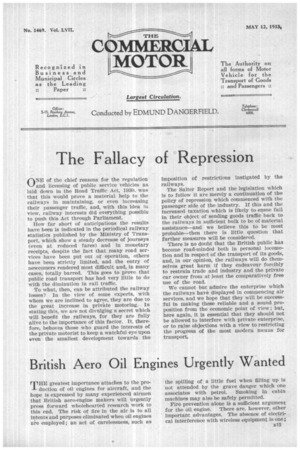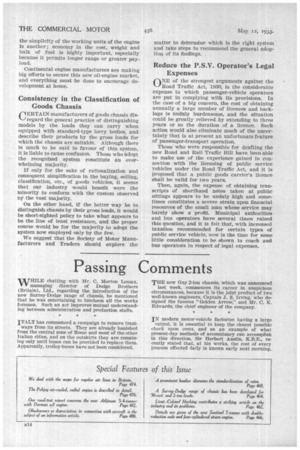British Aero Oil Engines Urgently Wanted
Page 31

Page 32

If you've noticed an error in this article please click here to report it so we can fix it.
THE greatest importance attaches to the production of oil engines for aircraft, and the hope is expressed by many experienced airmen that British aero-engine makers will urgently press forward wholehearted research work to this end. The risk of fire in the air is to all intents and purposes eliminated when oil engines are employed ; an act of carelessness, such as the spilling of a little fuel when filling up is not attended by the grave danger which one associates with petrol. Smoking in cabin machines may also be safely permitted.
Fire prevention alone is a sufficient argument for the oil engine. There are, however, other Important advantages. The absence of electrical interference with wireless equipment is one; the simplicity of the working units of the engine Is another; economy in the cost, weight and bulk of fuel is highly important, especially because it permits longer range or greater payload.
Continental engine manufacturers are making big efforts to secure this new oil-engine market, and everything must be done to encourage development at home.
Consistency in the Classification of Goods Chassis
CERTAIN manufacturers of goods chassis disregard the general practice of distinguishing models by the loads they can carry when equipped with standard-type lorry bodies, and describe their products by the gross loads for which the chassis are suitable. Although there is much to be said in favour of this system, it is liable to cause confusion. Those who adopt the recognized system constitute an overwhelming majority. If only for the sake of rationalization and consequent simplification in the buying, selling, classification, etc., of goods vehicles, it seems that our industry would benefit were the minority to conform with the custom observed ny the vast majority.
On the other hand, if the better way be to distinguish chassis by their gross loads, it would be short-sighted policy to take what appears to be the line of least resistance, and the proper course would be for the majority to adopt the system now employed only by the few. We suggest that the Society of Motor Manufacturers and Traders should explore the matter to determine which is the right system and take steps to recommend the general adoption of its findings.
Reduce the P.S.V. Operator's Legal Expenses
ONE of the strongest arguments against the ‘-/Road Traffic Act, 1930, is the considerable expense to which passenger-vehicle operators are put in complying with its provisions. In the case of a big concern, the cost of obtaining annually a large number of licences and backings is unduly burdensome, and the situation could be greatly relieved by extending to three years or so the duration of a licence. Such action would also eliminate much of the uncertainty that is at present an unfortunate feature of passenger-transport operation. Those who were responsible for drafting the new Road and Rail Traffic Bill have been able to make use of the experience gained in connection with the licensing of public service vehicles under the Road Traffic Act, and it is proposed that a public goods carrier's licence shall be valid for two years. Then, again, the expense of obtaining transcripts of shorthand notes taken at public sittings appears to be unduly high and sometimes constitutes a severe strain upon financial resources of the small man whose service may barely show a profit. Municipal authorities and bus operators have several times raised this question, and it is felt that, with increased taxation recommended for certain types of public service vehicle, now is the time for some little consideration to be shown to coach and bus operators in respect of legal expenses.




































































































